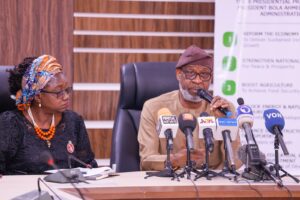

NDDC explores partnership with Coventry University
The Niger Delta Development Commission (NDDC) is exploring a partnership with Coventry University as part of its plans to ensure optimal value from its renowned foreign postgraduate scholarship programme.
The NDDC Managing Director Dr. Samuel Ogbuku embarked on a Monitoring and Evaluation (M&E) visit to the United Kingdom, to catalyse a potentially transformative partnership with Coventry University.
Dr. Ogbuku strongly believes this collaboration could usher in a new era for tertiary education in the Niger Delta region.
He said, “We want to see the presence of a world-class university like Coventry right here in the Niger Delta. This would make quality international education accessible to more of our talented students, maximizing the long-term impact of our scholarship investments.”
During the visit, the NDDC delegation directly assessed the progress and well-being of students currently sponsored by the program. Dr. Ogbuku also underscored the importance of academic excellence, announcing that outstanding scholars may be considered for doctorate degree scholarships.
The NDDC Managing Director, Dr Ogbuku, who tabled the proposal during a meeting with the authorities of the institution, said he wants to strengthen the ties with the school so that “Coventry University can have a presence in the region and those who cannot afford to come here can also benefit from the quality education the university offers”.
Ogbuku was the head of the delegation from the Commission on a Monitoring and Evaluation (M&E) visit to appraise the academic progress and welfare of scholars sponsored by NDDC to the universities in the United Kingdom. Other members of the delegation were the Executive Director, Corporate Services, Hon. Ifedayo Abegunde; the Executive Director, Finance and Administration; Alabo Boma Iyaye; the director, Education Health and Social Services, Dr George, Uzowanne; the director of Planning, Research and Statistics, Mr. Davies Okarevu and the Director Education, Mrs. Idara Akpabio.
The NDDC boss suggested three formulas for the partnership, one of which could be “a collaboration with the existing universities in the Niger Delta region so those universities can develop their faculties to the standards of Coventry University.
“Another formula is the development of specific faculties on aspects of information technology like Artificial Intelligence (AI). If in our universities in Nigeria, we do not actually have AI, you can bring AI courses to our universities. We can also sponsor students to those schools so that our investment will not only be in bringing them here which is capital flight for the region.”
Ogbuku also announced that the Commission would build E-Libraries in all the nine states of the region. He called for partnership with Coventry University on the project by providing hard and soft materials for the libraries so that those doing research could have access to up-to-date materials as the E-libraries would be affiliated to Coventry University and have the same standards. The E-Libraries would also boost the reading culture in the region
Ogbuku implored Coventry University to work with Commission on the specifics to bring the partnership idea to fruition as he would like to see the relationship go beyond ‘sending scholars.
“We can have the semblance of Coventry University in the Niger Delta region of Nigeria.”
The Pro-Vice Chancellor, International, Professor Richard Wells, who led the University delegation to the talks, welcomed the idea of the partnership. According to him the university, which has 24,000 students in overseas campuses, has been exploring ways of setting up in Sub-Saharan Africa for some time.
He said, “We have been looking for opportunities for transnational education in sub-Saharan Africa. There are issues around the commercial model but your comments about being able to work in partnership with governments and sponsoring bodies is what actually makes the difference and makes the potential project feasible.”
He said the University saw itself as an economic development agent, as education was one of the cornerstones of economic development.
Wells agreed that the University needed a deep strategic conversation with the NDDC not just on the number of students they would be sending to the institution but also “helping you educate your students locally which will help your overall budget.”
Dr Ogbuku appointed Dr George Uzonwanne and the Commission’s scholarship consultant, Mr. Godson Ideozu, to work out the details of the partnership with the University.
Addressing the students later, the Managing Director challenged them to excel academically and also pick the best of British culture to make the difference on their return to Nigeria.
He announced that any scholar of the institution who made a distinction would be considered for a doctorate degree scholarship.
Speaking through their leader, Promise Owai, the scholars thanked the Commission for the opportunity to have quality education in the UK. They promised to remain worthy ambassadors of the Niger Delta and to break grounds academically in the school.
The NDDC sponsors an average of 200 scholars for postgraduate studies in institutions across the world every year. The scholars are expected to acquire the requisite knowledge and skills to further the development of the region on their return.




